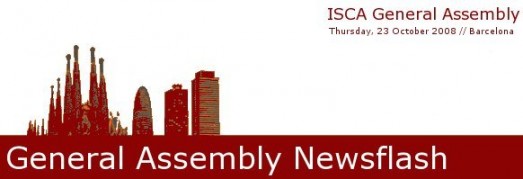Sport Political statement From the ISCA General Assembly 2008
23/10/2008

Human Capital and Values in Action - The societal role of Sport for All
The Sport for All sector and its organisations produce the Human Capital on which societies are being built and developed. The core production and services are based on human values and are an integrated part of human life.The Human Capital is realised through organisations primarily based on voluntary commitments, where recreational sport, leisure and educational activities are made available to the local citizens.
Civil society organisations and in particular the most widespread structure – Sport for All – contributes to development of our societies. However, the Sport for All sector can contribute even more. More Human Capital can be released to tackle societal challenges and improve the quality of life.
To fully release the potential of the Sport for All sector, investment in the Sport for All sector and more cooperation between the public, the corporate and the civil society sectors is needed.
Societal challenges
Societies around the world face different challenges, but the past years and especially the recent months have shown us that in a world ruled by globalization, the challenges have also become global. At this moment many countries in the world are facing economic stagnation, and the results are difficult to predict. For some years already, public health has been a major challenge and unfortunately the results are well-known if committed action is not taken. The dialogue between cultures is both a global and local issue, and the effect of the global demographic development presents new challenges.Health
Public health has become prominent on the political agenda in the past few years and will continue to constitute a huge national and international challenge in the years to come. Sedentary lifestyles, physical inactivity and obesity are some of the obstacles on the “healthy road of life”. For individuals and for nations, this health challenge has a huge impact, both socially and financially. Sport and its widespread organisational structures provide one of the important settings, where people can be reached, motivated and assisted to change their lifestyle and improve personal health.Governments and the sectors responsible for health promotion and - prevention are often not themselves able to reach the citizens and to motivate them to healthier lifestyles. This is where the “Sport for All” sector has a valuable set-up to offer to citizens, local communities and governments. This unique value of the sport organisations is ready to be utilised and maximised through quality programmes and activities.
Integration
One of the most direct results of globalization is the movement of people across borders, and between cultures. Improved intercultural dialogue is in high demand as a result, in order to create dynamic societies based on mutual understanding and respect.Sport, in terms of its structures and settings, is often referred to and preferred as a solution to the major challenge of creating intercultural dialogue in societies. However, more long-term commitment and quality interventions are a necessity to succeed. Integration and intercultural dialogue do not come automatically, neither in the sport organisations, nor in society at large.
Conclusion
The Sport for All sector – in partnership to meet societal challengesOn the occasion of the International Sport and Culture Association (ISCA) General Assembly 2008, the delegates, as representatives of Sport for All organisations world-wide
Commit to
• clarify their role as key civil society organisations with potential to reach citizens on a large scale. This means defining and communicating willingness to act on societal challenges, and prioritise this action.
• open up for partnerships with other civil society organisations, with national and local governments, and with the corporate sector. This means that “going alone” is not an option if value can be added by broader cooperation.
Request of public and private institutions
• long term commitmentin the programmes defined to tackle societal challenges in cooperation with the Sport for All sector. One-off events and 1-year projects will not be enough.
• that their support to elite sport and Sport for All is balanced to allow for the dynamic development of both sectors.
• that interventions are cross-cuttingacross civil society, public and private organisations and across topics, to see for instance the health issue in a perspective that includes both sport/physical activity, urban planning, nutrition and awareness to special target groups such as children or senior citizens.
• that focus remains on investment in Human Values and Human Capital as described above to ensure strategies that are sustainable and targeted towards the real agents of change – individual citizens.
Posted on 23/10/2008 by

